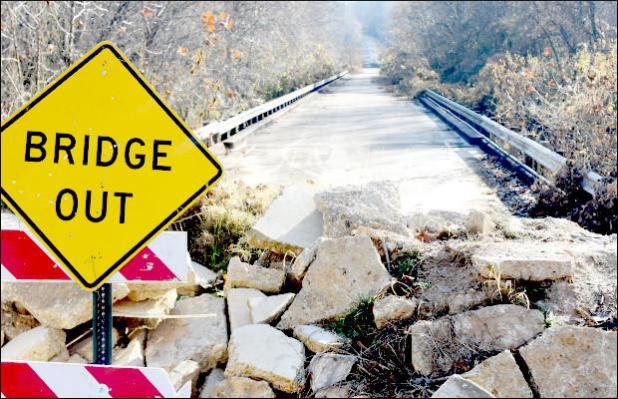
The Tippah River Bridge is one of the bridges that will be replaced. It has been closed three years. The project will be rebid in early 2022.
Photo by Barry Burleson
County gets $12 million for bridges
Marshall County got good news recently with the approval of money from the legislature for replacing two bridges in District 5.
Tippah River Bridge and “Goat Bridge” on Bethlehem Road will be replaced with the funding.
County engineer Larry Britt said combining the request for both bridges in one application was what he thinks cinched the approval.
The construction bids on the Tippah River Bridge have been going over engineering estimates for several years, leaving the bridge cut off from traffic.
So, Britt’s strategy was to bundle both bridges into one application expecting the larger request for bridge replacement would be more likely funded than smaller individual requests.
“My understanding is they only selected 12 projects over the 82 counties and MDOT (Mississippi Department of Transportation) got four projects,” Britt said. “They spend money on big things. The reason they are funding it, in my opinion, is the bridges are on a federal route.”
Larry Hall, outgoing county administrator, said Tippah River Bridge was worked on about 23 years ago when the wood pilings were rotting. All the bad pilings were replaced then.
The county replaced about half the wood pilings with steel out of the county road and bridge budget, he said. At that time the county spent at least $300,000 to replace the pilings with steel. Construction at that time required driving a steel piling on each side of the cap putting a cross piece between them.
Tippah River Bridge, Bridge No. 135, is already in a flood zone and silt coming down the river from Tippah and Benton counties has filled in under the bridge.
Replacing the Tippah River Bridge will involve raising the new bridge about 10 feet since dredging is no longer allowed due to environmental regulations.
Bridge No. 135 was funded in the ERBR (Emergency Road and Bridge Repair Fund) project, phase 1 allocation of funds in 2019, according to Britt. The total funds allocated for the project were $3,628,664 with $3,252,534 set up for construction, he said. The plans were completed, environmental studies approved and easements were obtained from the U.S. Army Corps of Engineering in February 2020, he said.
Federal guidelines included minority solicitation, DBE Goals for minority participation, Davis Bacon Act prevailing wage rates to contractors and minimum wage rates, Britt said.
The project was bid in March 2020 and the low bid came in at $5,794,595, far beyond the funds available, Britt said.
Additional funds were appropriated through the Mississippi legislature, Marshall County Board of Supervisors and the Marshall County LSBP (Local System Bridge Program) funds, assuming the extra funds would be enough, Britt said.
The project was bid a second time July 27, 2021. The low bid was $6,402,327, and once more funds were short.
The last bid was about $400,000 over the engineering estimates, Hall said.
Marshall County was not able to find sufficient money when the second bid came in over estimate, at $6,402,327, and the contract was not awarded.
The county had difficulty getting the funding to replace the bridge. Therefore, the Marshall County Board of Supervisors resubmitted the project for funding under ERBR Phase 2 for the estimated cost of construction.
Britt said since the environmental studies, right of way and all permits are in hand, the Tippah River Bridge project can be rebid in early 2022.
Under the ERBR Phase 2 program, the county was awarded $12,123,331 to replace both bridges. The county asked for $11,021,210 and the MDOT added plus or minus 10 percent for contingencies to compute the just over $12 million allocation, Britt said.
Goat Bridge, Bridge No. 116, that crosses Little Spring Creek, is called goat bridge because a farmer near the bridge had lots of goats that got out often and would stand under the bridge to rest and feed, Britt said.
Goat Bridge was repaired in the 1980s, Hall said, with eight-inch to 10-inch steel pilings. Over the years the steel has rusted out, he said.
Hall said he thinks these two bridges qualified for federal program dollars because of the route through the National Forest and the Sardis Reservoir.
Britt said the application’s approval had something to do with the federal government designating certain routes under President Dwight Eisenhower as federal routes.
“The president wanted the bridges designated as federal routes so the federal funds could be used to keep these roads up to standard if military troops and equipment needed to cross over,” Britt said.
Goat Bridge was first programmed for federal funds in 2014 with a project total of $1,701,100, Britt said. The fact that Bethlehem Waterford Road is a federal route (0977) makes these bridges eligible for federal program dollars, he said.
The Tippah River Bridge, 1,100 feet long, has been closed for three years. The estimated cost for construction which includes engineering and contingencies, is $8,883,169.
The cost to replace Goat Bridge, 362 feet long, is estimated to run $3,240,162 and includes, relocation of utilities, wetland mitigation and contingencies, Britt said.
The inconvenience to motorists and farmers has been immense while waiting for the bridges to be replaced.
Residents and traveling public have been detouring about seven miles to bypass the closed bridge, Britt said.
Goat bridge is not closed but posted at 7.5 tons weight limit.
Britt said this requires truck traffic to be rerouted over low weight limit county roads which in turn causes damage to the base and pavements of these roads. Goat Bridge is also a school bus route which causes logistics problems for students attending Marshall County Schools in the District 5 area (Mary Reid and Potts Camp schools.)
Low weight bridges cause farmers problems in moving their heavy farm equipment from farm to farm and their harvested crops to market.

